| Srl | Item |
| 1 |
ID:
137939
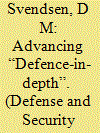

|
|
|
|
|
| Summary/Abstract |
This article aims to encourage the fostering of more systems thinking, and its greater exploitation, within the domain of contemporary intelligence. With particular focus on “micro systems thinking” and with reference to key intelligence processes, such as intelligence analysis, the utility of many systems dynamics within the intelligence context seeks to be further revealed. Through their greater collective harnessing, including up to “System of Systems” (“SoS”) dynamics, and promoting all that they can offer, more sophisticated overarching operational-to-strategic/policy “ends,” notably that of “defence-indepth,” can be viably further advanced in a sustainable manner into the future. Arguably, a much-needed transformative impact on contemporary intelligence can also be increasingly realised through comprehensively engaging in and with more systems and SoS thinking. Aiding civil protection tasks, crisis management, emergency planners, and civil contingency practitioners likewise gain.
|
|
|
|
|
|
|
|
|
|
|
|
|
|
|
|
| 2 |
ID:
153079
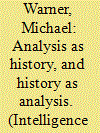

|
|
|
|
|
| Summary/Abstract |
History is something far from storytelling about the past; it has its own methods, discipline, techniques, and value. The same can be said about intelligence analysis, which is a comparative newcomer to the professions. Like historians, analysts seek to gather information, evaluate their sources, create meaning from disparate bits of evidence, and impart significant findings. These considerations make it important for analysts to learn their history and how the discipline of history functions. A greater ‘historical sense’ can make analysts more rigorous in their work, and less likely to be frustrated by the situations they see around them.
|
|
|
|
|
|
|
|
|
|
|
|
|
|
|
|
| 3 |
ID:
127712
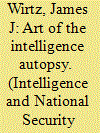

|
|
|
|
|
| Publication |
2014.
|
| Summary/Abstract |
Although intelligence postmortems are a common practice in the aftermath of intelligence failure, little is known about how they are conducted. This article explores the methodology employed by Robert Jervis in intelligence postmortems that followed the fall of the Shah of Iran in 1979 and the formulation of the 2002 Iraq national intelligence estimate that warned of the possibility that Iraq had restarted its nuclear program. The analysis reveals the challenges faced by scholars as they attempt to assess why analysts failed to offer accurate estimates and the way contemporary international relations theory can be applied to the realm of policy. The findings of the postmortems also shed light on areas where additional collaboration among scholars and analysts can advance the art of intelligence analysis.
|
|
|
|
|
|
|
|
|
|
|
|
|
|
|
|
| 4 |
ID:
111616
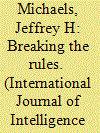

|
|
|
| 5 |
ID:
108723
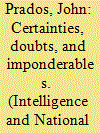

|
|
|
|
|
| Publication |
2011.
|
| Summary/Abstract |
One way to explore the question of whether and how intelligence influenced the course of the Cold War is to review its impact within a defined arena of political-military activity. This paper investigates several areas in which intelligence analysis influenced the superpower strategic competition: forging of military doctrines, the design of weapons systems, and the progression of international crises. The analysis focuses on the United States case, where it finds cases in which US intelligence had beneficial effects but others in which intelligence performance proved more problematic in either shortening the Cold War or reducing its dangers.
|
|
|
|
|
|
|
|
|
|
|
|
|
|
|
|
| 6 |
ID:
153077
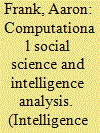

|
|
|
|
|
| Summary/Abstract |
Computational Social Science (CSS) is an emerging, interdisciplinary approach to the study of social systems. This chapter provides readers with an introduction to CSS, and discusses why examining the behavior of individuals and groups in social systems from an algorithmic perspective provides new and exciting analytic opportunities for the Intelligence Community and analytic tradecraft. Through the use of artificial societies, commonly referred to as Agent-Based Models (ABMs), intelligence analysts can improve strategic intelligence assessments by capitalizing on the scientific and tradecraft merits of computational simulation.
|
|
|
|
|
|
|
|
|
|
|
|
|
|
|
|
| 7 |
ID:
139206
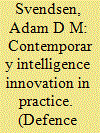

|
|
|
|
|
| Summary/Abstract |
Currently, “macro” systems thinking is arguably most evident in intelligence studies. Appearing especially apparent are characterisations of different intelligence architectures, strongly associated with grander-ranging national or central intelligence systems and their associated machinery, even being bounded as intelligence communities. Following on from noteworthy US defence sector developments, which have demonstrable relevance both to and for closely overlapping contemporary intelligence work, more “micro” systems thinking – namely involving intelligence-related “System of Systems” (“SoS”) concepts – is increasingly emergent. For helping to facilitate and better understand contemporary intelligence innovation, SoS constructs and their dynamics are now deserving of being further examined and refined. This includes as they pertain to the conduct of several multifunctional and special operations occurring across the world during an overall era of globalised strategic risk, and as the study and practice of intelligence aims towards further extension and adaptive transformation.
|
|
|
|
|
|
|
|
|
|
|
|
|
|
|
|
| 8 |
ID:
084736
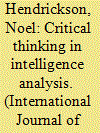

|
|
|
| 9 |
ID:
167479
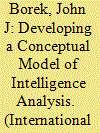

|
|
|
| 10 |
ID:
151789
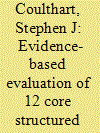

|
|
|
|
|
| Summary/Abstract |
If you always do what you’ve always done,” goes an old saying, “you’ll always get what you’ve always got.
|
|
|
|
|
|
|
|
|
|
|
|
|
|
|
|
| 11 |
ID:
103578
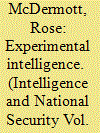

|
|
|
|
|
| Publication |
2011.
|
| Summary/Abstract |
This article explores the use and application of experimental methodologies in intelligence analysis. Previous experimental work has much to tell us about how people process information in making judgments. Calibration, and how appropriate levels of confidence might be improved with systematic feedback, is addressed. Training around uncertainty biases is covered. Extant experimental work suggests mechanisms and tests which might be used to better screen potential analysts for personality characteristics that might make them more suited for some tasks over others. The paradigm of experimental manipulation serves as a useful template for exploring alternative conceptualizations of uncertain environments.
|
|
|
|
|
|
|
|
|
|
|
|
|
|
|
|
| 12 |
ID:
171062
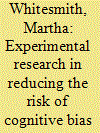

|
|
|
| 13 |
ID:
173647
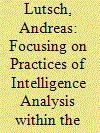

|
|
|
| 14 |
ID:
179142
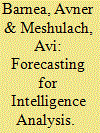

|
|
|
|
|
| Summary/Abstract |
A successful strategic surprise, whether in the military or business sector, can have critical significance both for the initiating organization (the “attacker”) and the organization under attack (“the victim”). In the military sector, the attack can disrupt the victim’s strategic organization, inflict untold damage, foil its ability to protect itself and to react, and even determine the outcome of the battle. For example, the sudden strike that the Germans unleashed on the USSR in Operation Barbarossa (1941) disrupted the USSR’s defense systems, dealt the Russian soldiers a fatal blow, and greatly expedited Germany’s huge land invasion of the USSR. It took the USSR two to three years to recover and rebuild to the level where it could challenge the German powerhouse. The attack on Pearl Harbor in 1941 had the same destructive effect on U.S. forces in a single day.
|
|
|
|
|
|
|
|
|
|
|
|
|
|
|
|
| 15 |
ID:
147580
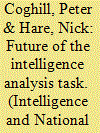

|
|
|
|
|
| Summary/Abstract |
Information technology will have a significant impact on the intelligence analysis workflow, skills, and organization in the next couple of decades. In future, instead of ingesting information themselves, analysts will use a range of information tools to add value to data. Future analysts will need less knowledge of subject matter, and more general reasoning skills. The future task will involve more creativity, and less focus on detail, than today.
|
|
|
|
|
|
|
|
|
|
|
|
|
|
|
|
| 16 |
ID:
168620


|
|
|
|
|
| Summary/Abstract |
This article analyses intelligence assessment as performed by Hezbollah and Hamas and similar Violent Non-State Actors (“VNSA”). VNSA’s seek to inflict the highest level of harm on adversary states without provoking full-scale wars, which they avoid due to military asymmetry. Improved intelligence regarding a state’s cost/benefit analysis of unleashing full-scale war thus enables VNSA’s to “safely” calibrate operations to maximize harm. Such efforts might prove error-prone for three reasons: the authoritarian structure characterizing VNSAs; psychological bias regarding both self and enemy; and a “transparency fallacy” concerning target states. Assessments of Hezbollah (2006) and Hamas (2014) serve as case studies.
|
|
|
|
|
|
|
|
|
|
|
|
|
|
|
|
| 17 |
ID:
153987
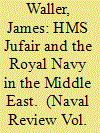

|
|
|
| 18 |
ID:
153083
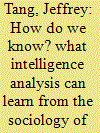

|
|
|
|
|
| Summary/Abstract |
Despite the appeal of correctness batting average as a metric for evaluating analysts, such an approach may be fundamentally misguided. Scholarship in the sociology of scientific knowledge demonstrates the inherent difficulty of determining what ‘actually happened.’ Knowledge in intelligence is socially constructed by practitioners and experts, just as it is in science. Thus, the ‘truth’ about what happened in a particular circumstance is what a group of credential experts say happened. Intelligence studies might benefit from insights gained in science and technology studies to illuminate practices and modes of operation that have thus far gone unexamined.
|
|
|
|
|
|
|
|
|
|
|
|
|
|
|
|
| 19 |
ID:
082082
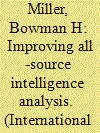

|
|
|
| 20 |
ID:
153082
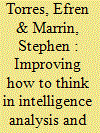

|
|
|
|
|
| Summary/Abstract |
Common thinking strategies can be used by both intelligence analysts and medical doctors to improve decision-making and produce positive outcomes. Best practices can flow in both directions between professions since medicine shares strong parallels with intelligence analysis. Improving performance in both fields involves an assessment of key problems and current efforts to overcome them. Perhaps the most important issues affecting both fields are related to cognition. In medicine and intelligence analysis, errors are often triggered by cognitive biases that appear during the decision-making process. Identifying and preventing these errors would contribute towards improving performance and results in both fields.
|
|
|
|
|
|
|
|
|
|
|
|
|
|
|
|